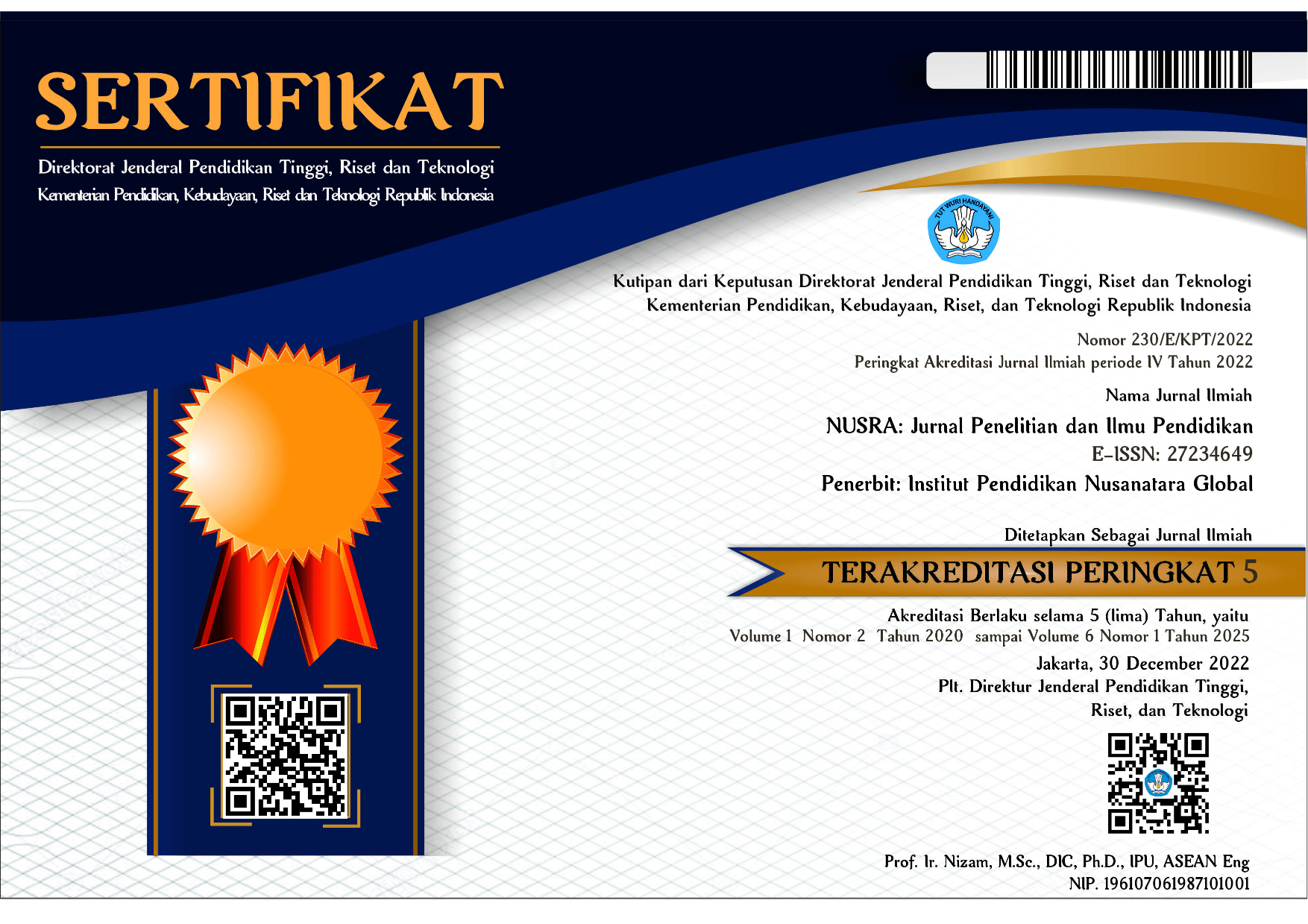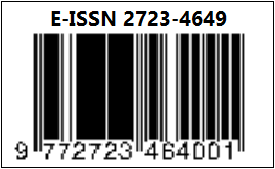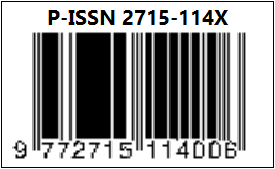RELIGIOSITY AND RELIGIOUS STUDIES: CONTRIBUTION IN THE EMOTIONAL INTELLIGENCE OF UNIVERSITAS BINA BANGSA STUDENTS
DOI:
https://doi.org/10.55681/nusra.v4i3.1290Keywords:
Religiosity, Religious studies, Emotional intelligence, Empathy, Emotional well-beingAbstract
This study discusses the role of religiosity and religious studies in contributing to the development of students' emotional intelligence. Religiosity and religious studies have long been important aspects of individual and societal life, and this study aims to understand its impact on students' emotional development. Through religious studies, students can develop a better emotional awareness of their own feelings and emotions, as well as recognize how those emotions affect behavior and interactions with others. The values of empathy, compassion, and responsibility instilled by religious practice also help students develop the ability to feel the feelings and perspectives of others, which are key aspects of emotional intelligence. In addition, religious practices provide guidance on how to cope with negative emotions and manage stress, thus helping students deal with challenges in a healthier and positive way. Religious studies also provide a deeper purpose in life and a sense of inspiration for students to achieve their goals, helping them stay energized in the face of obstacles, and seek deeper meaning in life. However, the positive effects of religiosity and religious studies on emotional intelligence can vary between individuals and depend on the application of religious values in daily life. Therefore, a holistic and inclusive approach in respecting the diversity of religious beliefs and religious practices is essential in recognizing the benefits of the role of religiosity and religious studies in shaping students who are more empathetic, balanced, and contribute positively to society.
Downloads
References
Abdullah Faiq, Z., Pratama Putra, D., &; Imammul, I. (2023). The Psychological and Social Impact of Children Due to Parental Divorce in the Perspective of Islamic Values. Al-Mutharahah: Journal of Research and Social Religious Studies, 20(1), 1–10. https://doi.org/10.46781/al-mutharahah.v20i1.322
Alfian, M. R., Kaukab, M. E., &; Romandhon, R. (2020). The role of students' spiritual and emotional intelligence in understanding accounting science. Paramurobi: Journal of Islamic Education, 3(1), 35–45. https://doi.org/10.32699/paramurobi.v3i1.1432
Bahrudin, F. A. (2020). The role of the Pancasila Education course as a general compulsory subject in developing student personalities that are in accordance with Pancasila values. Pro Patria: Journal of Education, Civics, Law, Social, and Politics, 3(1), 49–66. https://doi.org/10.47080/propatria.v3i1.776
Brahma, I. A. (2020). The role of the school principal in fostering the democratic attitude of teachers at SDN Mekarjaya 31 Depok. Journal of Education (JIP) STKIP Kusuma Negara, 12(01), 61–70. https://doi.org/10.37640/jip.v12i1.169%0Ahttp://jurnal.stkipkusumanegara.ac.id/index.php/jip/article/view/169/253
Chita, A., &; Harahap, P. (2021). Analysis of the Basic Skills of Group Leaders on Students Following the Practicum of Group Procedures. 8(2), 57–62.
Fauzi, A. (2022). Integration of Qur'an-based collaborative education in the relationship between emotional intelligence and social behavior in students of the Faculty of Engineering, Islamic University 45 Bekasi. TARQIYATUNA: Journal of Islamic Education and Madrasah Ibtidaiyah, 1(1), 44–58. https://doi.org/10.36769/tarqiyatuna.v1i1.204
Fauziyyah, N., &; Irman, I. (2019). The values embodied in the film The Sinking of Van Der Wijck's Ship. Istinarah: religious, social and cultural research, 1(1), 69. https://doi.org/10.31958/istinarah.v1i1.1522
M. (2017). Develop education that respects human values and nature. In EDUKASI: Journal of Religious and Religious Education Research (Vol. 1, Issue 4). https://doi.org/10.32729/edukasi.v1i4.338
Khoiri, A., Susilawati, E., Hamidah, M. P., Kusuma, J. W., Eko Suharyanto, S. T., Kom, M., ... & Kom, M. (2023). Konsep Dasar Teori Pendidikan Karakter. Cendikia Mulia Mandiri.
Kusuma, J. W., Hamidah, H., Hidayat, S., Nazibah, D. P., Rochmah, M., Saurma, S. T., & Suminar, R. (2023). Technopreneurial STEM Teaching: Integrating Business, Curriculum, and Education. Edumaspul: Jurnal Pendidikan, 7(1), 451-456.
Mariyono, A. (2020). The value of nationalism in commemorating religious holidays together with the residents of Sampetan Boyolali Village to grow saddha. Journal of Education, Social Sciences, and Religion, 6(2), 78–89. https://doi.org/10.53565/pssa.v6i2.231
Monalisa, M., Daharnis, D., &; Syahniar, S. (2016). The contribution of emotional intelligence and social perception to students' social interactions and their implications in guidance and counseling. JPPI (Indonesian Journal of Educational Research), 2(2), 1–10. https://doi.org/10.29210/02016143
Musriaparto. (2022). SYNTHESIS: Journal of Islamic and Social Religious Studies. 3(2), 1–18.
Natania, J., &; Sanjaya, E. L. (2023). Can spirituality and social support increase life satisfaction among students who are members of the Christian Student Fellowship? Journal of Psychology, 16(1), 107–119. https://doi.org/10.35760/psi.2023.v16i1.7123
Princess, W. (2022). Legal values and a sense of justice that live in Indonesian society? Journal of Echoes of Justice, 9(2).
Sikapaliling, Y. (2023). Anthropological study of Unnalli Melo in relation to religious and social life in the community in Toraja. http://dx.doi.org/10.31219/osf.io/n7fsy
Tarbiyah, J. (2023). Tarbiyah Journal ; Scientific Journal of Education and Religion Vol 07 No. 01 January-June 2023 http://ojs.iai-darussalam.ac.id/index.php/tarbiyah. 07(01), 1–14.
John, H. R., &; Yuliawati, L. (2022). Are religious and humble people more religiously tolerant? The influence of religiosity and intellectual humility on religious tolerance in students. Journal of Psychology, 15(2), 284–299. https://doi.org/10.35760/psi.2022.v15i2.6158
Downloads
Published
How to Cite
Issue
Section
License
Copyright (c) 2023 NUSRA: Jurnal Penelitian dan Ilmu Pendidikan

This work is licensed under a Creative Commons Attribution-ShareAlike 4.0 International License.














